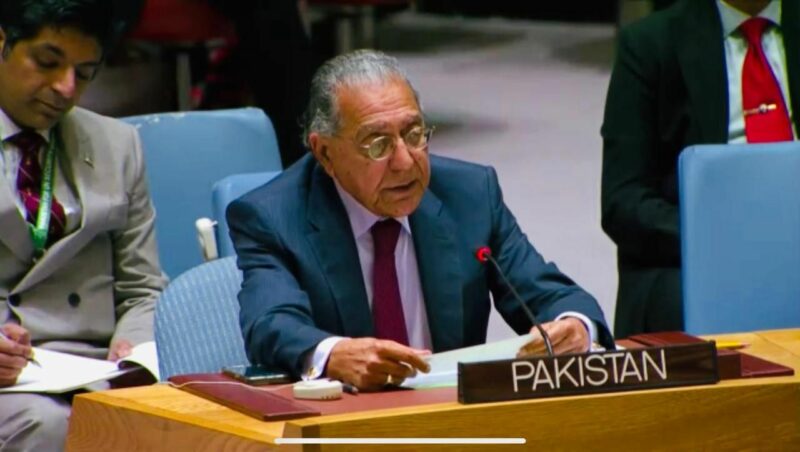NEW YORK: Pakistan has warned the world of a serious threat of terrorism within and from Afghanistan.
The 34th report of the UN monitoring team has shone sufficient light on the disturbing dimension of terrorism emanating from Afghanistan.
Pakistan’s Permanent Representative to the United Nations Ambassador Munir Akram made these remarks while delivering a statement in the UN Security Council meeting on the situation in Afghanistan, says a press release.
Ambassador Munir Akram termed the TTP, known as Fitna Al Khawarij in Pakistan, as the largest terrorist organization in Afghanistan that is conducting almost daily terrorist attacks against Pakistan with full support and protection of the Afghan Interim Government (AIG) and sponsorship of Pakistan’s major adversary.
Indicating the TTP’s potential of causing regional destabilization, Ambassador Akram said that the terrorist group was fast emerging as an umbrella organization that is now coordinating with secessionist groups such as Majeed Brigade.
“And, given its long association with Al-Qaeda, it will not be long before the TTP becomes the spearhead for Al-Qaeda’s planned regional and global terrorist goals,” Ambassador Akram warned.
He asked the world to be concerned by the threat it could confront from a strengthened TTP in the not too distant future. He said Pakistan was ready to cooperate with regional and international organizations to eliminate the TTP threat and will continue to take national action against the terrorist organization.
Ambassador Munir Akram reaffirmed Pakistan’s dedication to supporting a peaceful and stable Afghanistan, echoing the shared aspirations of its neighboring countries and the international community for greater political inclusivity in Afghanistan.
He said Pakistan firmly believes that such inclusivity is vital for enhancing the prospects of stability and normalization within that country.
However, the Pakistan UN envoy expressed deep concern about the ongoing violations of human rights by the Afghan Interim Government (AIG), particularly against women and girls.
“The AIG has not only reneged on its commitments regarding women and girls but has exacerbated the situation by issuing new directives aimed at silencing their voices,” he stated.
Ambassador Akram said Pakistan strongly condemns these actions. He said that these backward measures violate the true essence of our enlightened religion, which was among the first to uphold equal rights for both men and women.
The Pakistan envoy said that while we remain committed to constructive engagement with the Taliban regime, it is clear that the regime must not be allowed to manipulate regional and international dynamics to avoid its obligations.
He also expressed deep concern over the ongoing humanitarian crisis in Afghanistan, three years after the Taliban assumed power. He said that with 23.7 million Afghans in desperate need of humanitarian assistance, Pakistan urges the international community to provide aid without conditions.
The Afghanistan Humanitarian Needs and Response Plan, which seeks $3.06 billion in assistance, has received less than 25% of the required funds, he maintained.
“Immediate action is needed to fully fund this plan,” the Pakistan Permanent Representative emphasized. “It is essential that all possible sources of funding are mobilized to alleviate the suffering of the Afghan people.”
In addition to addressing the humanitarian crisis, Ambassador Akram reiterated Pakistan’s support for Afghanistan’s economic revival, highlighting the urgent need to revive the Afghan banking system, resolve the liquidity crisis, and create the conditions necessary for unfreezing Afghanistan’s national reserves.
“Pakistan is committed to expanding trade and commercial relations with Afghanistan and remains a key partner in implementing regional infrastructure and connectivity projects that will enhance economic stability and growth in the region,” the Permanent Representative added.
Pakistan’s top UN diplomat urged the AIG to comply with its international responsibilities, warning that policies fostering internal, regional, and global instability cannot continue unchecked.
The international community, Ambassador Akram suggested, must not lose sight of its objectives in Afghanistan. Engagement with the Taliban must have a clear direction. “We must determine the steps necessary to establish normalcy in Afghanistan and work towards its eventual integration into the global community,” he emphasized.
Ambassador Munir Akra said that to this end, Pakistan proposes that the international community builds on the recommendations of the Secretary-General’s Special Coordinator, Ambassador Feridun Sinirlioglu.
The report, he said, outlines a roadmap of reciprocal actions, focusing on counter-terrorism, human rights, political inclusivity, economic revival, and the easing of sanctions and political recognition.


Comments are closed.